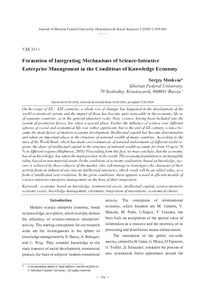Formation of Integrating Mechanisms of Science-Intensive Enterprise Management in the Conditions of Knowledge Economy
Скачать файл:
URI (для ссылок/цитирований):
https://elib.sfu-kras.ru/handle/2311/795Автор:
Moskvin, Sergey
C. Москвин
Дата:
2008-09Аннотация:
On the verge of XX – XXI centuries, a whole row of changes has happened in the development of the world economical system, and the impact of those has become quite noticeable in the economic life as of separate countries, so in the general planetary scale. Now, science, having been included into the system of productive forces, has taken a special place. Earlier the influence of science over different spheres of social and economical life was rather significant, but to the end of XX century, science became
the main factor of modern economy development. Intellectual capital has become determinative and taken an important place in the structure of national wealth of many countries. According to the data of the World Bank, which has made cost estimations of national endowments of different world regions,
the share of intellectual capital in the structure of national wealth accounts for from 43 up to 76 % in different regions (Majburov, 2003). Proceeding form this fact, we may conclude, that the economy, based on knowledge, has taken the main position in the world. This economy foundation is an intangible value, based on non-material assets. In the conditions of economy realization, based on knowledge, success
is achieved by those subjects of the market, who will manage to transfigure the character of their activity from an industrial one into an intellectual enterprise, which result will be an added value, as a form of intellectual rent revelation. In the given conditions, there appears a need in efficient models of science-intensive enterprise management on the base of their integration. В развитии мировой экономической системы на рубеже ХХ - XXI вв. произошел ряд структурных сдвигов, последствия которых заметны как в экономики отдельных стран, так и в общепланетарном масштабе. Особое место в них занимает включение науки в систему производительных сил. Влияние науки на различные сферы общественной и хозяйственной жизни было важно и ранее, однако к концу ХХ столетия наука превратилась в главный фактор развития современной экономики. Интеллектуальный капитал стал определяющим и занял важное место в структуре национального богатства многих стран. По данным Всемирного Банка, который произвел стоимостные оценки национального достояния различных регионов мира, доля интеллектуального капитала в структуре национального богатства составляет от 43 до 76 % по различным регионам [10]. Исходя из этого, можно сделать вывод, что в мире установилась и заняла господствующие позиции экономика, основанная на знаниях. Фундаментом этой экономики является неосязаемая ценность (intangible value), основанная на нематериальных активах. В условиях реализации экономики, основанной на знаниях, успех достигается теми субъектами рынка, которые сумеют трансформировать характер своей деятельности из индустриального в интеллектуальное предпринимательство, результатом которого станет добавленная стоимость, как форма проявления интеллектуальной ренты. В этих условиях появляется необходимость в эффективных моделях управления наукоемкими предприятиями на основе их интеграции.
Коллекции:
Метаданные:
Показать полную информациюСвязанные материалы
Показаны похожие ресурсы по названию, автору или тематике.
-
ASSESSMENT OF THE INFLUENCE OF THE STRUCTURE OF HUMAN AND PHYSICAL CAPITALS ON COMPETITIVENESS AND QUALITY OF ECONOMIC GROWTH OF THE RUSSIAN REGIONS WITH RESOURCE ECONOMY UNDER CONDITIONS OF THE GLOBAL TRANSITION TO KNOWLEDGE ECONOMY
Bukharova, E.; Kharchenko, T. О.; Semenova, A.; Samusenko, S.; Kharchenko, O. (2017-12)Assessment of the influence of fundamental factors of the knowledge economy development that have a specific refraction at the subregional level and assessment of the impact of the existing structure of human and physical ... -
ASSESSMENT OF THE INFLUENCE OF THE STRUCTURE OF HUMAN AND PHYSICAL CAPITALS ON COMPETITIVENESS AND QUALITY OF ECONOMIC GROWTH OF THE RUSSIAN REGIONS WITH RESOURCE ECONOMY UNDER CONDITIONS OF THE GLOBAL TRANSITION TO KNOWLEDGE ECONOMY
Бухарова, Е. Б.; Харченко, Т. О.; Семенова, А. Р.; Самусенко, С. А.; Харченко, О. Н. (2017-10)Assessment of the influence of fundamental factors of the knowledge economy development that have a specific refraction at the subregional level and assessment of the impact of the existing structure of human and physical ... -
Состояние и перспективы экономического развития россии на фоне цивилизационного кризиса
Робинсон, Б.В.; Robinson, Boris V. (Сибирский федеральный университет. Siberian Federal University., 2012-10)According to D. Meadows, the author of the most known forecasts of development of the world economy, time of debates on transition to a sustainable development is already gone, and within the next twenty years the world ... -
A MULTI-SECTORAL MODEL OF ECONOMIC DEVELOPMENT OF A RESOURCE REGION
Филимоненко, Ирина Владимировна; Васильева, Зоя Андреевна; Лихачева, Татьяна Петровна; Карпычева, Ольга Вячеславовна (2017-10)The aim of this paper is to explore the necessity of seeking new conceptual approaches to the management of spatial development of territories to confront the global challenges. The radical changes that have occurred in ... -
A MULTI-SECTORAL MODEL OF ECONOMIC DEVELOPMENT OF A RESOURCE REGION
Филимоненко, Ирина Владимировна; Васильева, Зоя Андреевна; Лихачева, Татьяна Петровна; Карпычева, Ольга Вячеславовна (2017-10)The aim of this paper is to explore the necessity of seeking new conceptual approaches to the management of spatial development of territories to confront the global challenges. The radical changes that have occurred in ...

